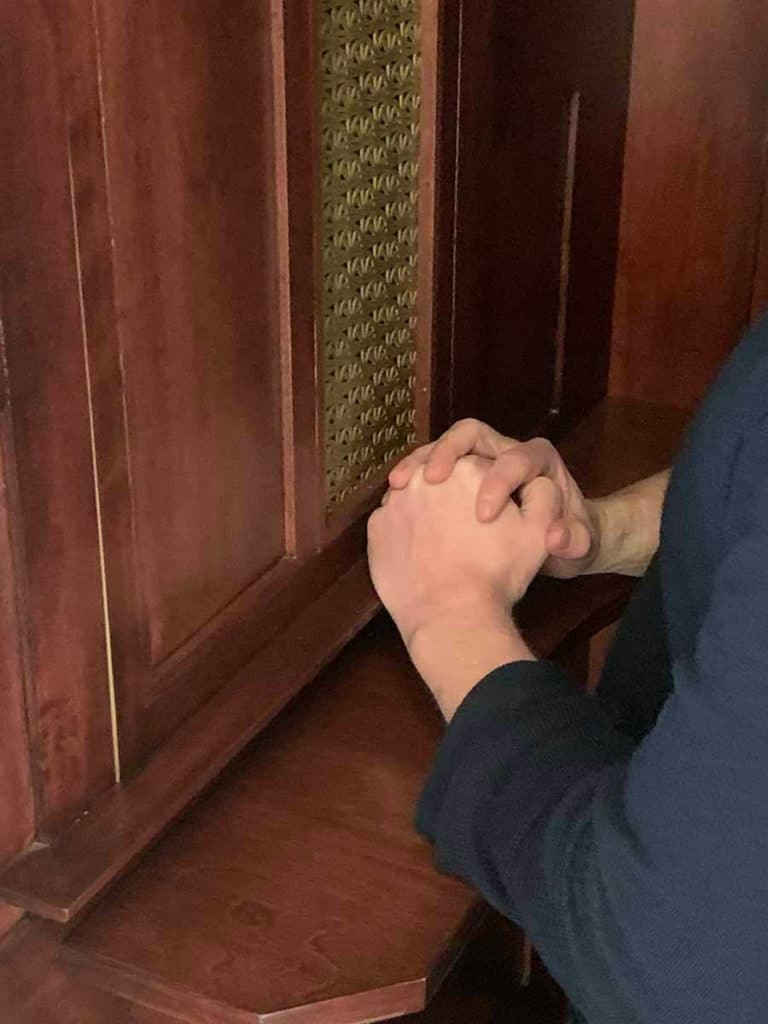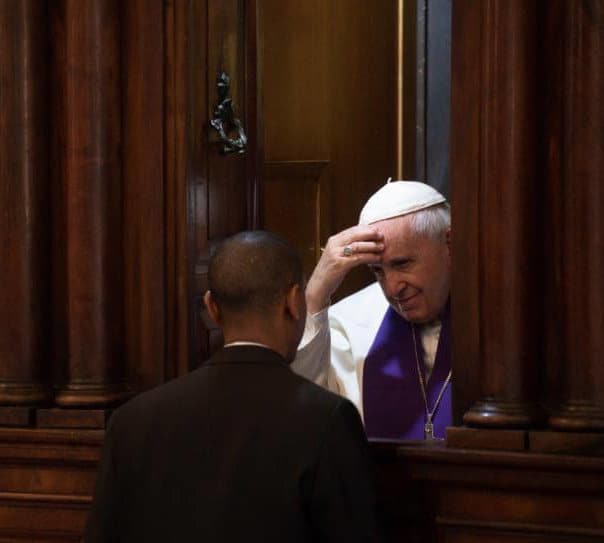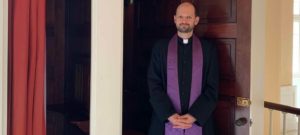
Editor’s Note: Because the the coronavirus pandemic, the Archdiocese of Baltimore’s Day of Reconciliation scheduled for March 30 has been canceled.
Confession has a confession to make: The sacrament of reconciliation isn’t the draw it once was.
A recent Pew Research Center study found that only 43 percent of American Catholics avail themselves of confession at least once a year. And from there, the numbers get grimmer. A paltry 17 percent go more than once a year, and scant 7 percent go monthly.
Usually offered in the middle of the weekend on Saturday afternoons, confession can be a hard sell for busy Catholics. The subject matter, sin, also can be a stumbling block in a culture that can be, at times, too enamored with accentuating the positive.
Confessing our shortcomings – on social media, in the therapist’s office and elsewhere – is more popular than ever. But seeking absolution and greater connection with God? Not so much.
That’s why some priests are pushing back against empty confessionals in novel ways. It’s time for confession to make a comeback, they say.
“It wasn’t preached, and it wasn’t made available,” Father Michael DeAscanis, pastor of St. Philip Neri in Linthicum Heights and parish administrator of St. Clement I in Lansdowne, said of the decline. “The more we talk about the benefits of confession and the more we make it available, make it easier for people. I think you’ll see this rediscovering of confession.”
Father Brian Nolan joined St. Isaac Jogues in Carney about a year and a half ago as pastor and realized the regular Saturday afternoon confession time wasn’t going to cut it.
“Probably the worst time of anybody’s week,” Father Nolan said. “Like, who stops midday on a Saturday? What we say in general that is you meet people where they are. Everybody comes on Sunday.”
He started offering another session on Sunday night, right before St. Isaac Jogues’ most popular Mass. Father Nolan said the parish is making slow and steady progress encouraging more attendance.
Father Nolan is realistic that reviving the sacrament of reconciliation will be an uphill battle, but the fight is worth it, he says.
“Some people could say, well, sin is negative, but it’s real. And to ignore it, it’s like ignoring cancer,” Father Nolan said. “Instead of being weighed down by sins and blocking at times the grace of God in your life, why not have a free, full availability of receptivity to God and his grace?”
Charles Strauss, associate professor of history Mount St. Mary’s University in Emmitsburg, said the decline in confession in the United States began in the 1960s. But before that, from about 1840 to the 1950s, the sacraments, including confession, were woven into the daily lives of many Catholics, especially recent European immigrants.
“Frequent confessions, weekly or monthly, just became part of the cycle. You know, part of the schedule of one’s life,” said Strauss, who also serves as executive secretary-treasurer of the American Catholic Historical Association. “And it was not just regulated by parents, but by authority figures like Catholic school teachers, mostly religious and by parish priests.”
The decline in confession can’t be traced to one cause, but many factors, said Strauss, a parishioner of St. Francis Xavier in Gettysburg, Pa. The suspects are many and varied: a general distrust in the authority that became prominent in the 1970s, well-meaning reforms by the church that de-emphasized sin may also have discouraged penance and even the move toward a less formal society.
“If you’re not having a meal in your home together, is it going to be even realistic to think you’re going to follow other rituals of your religious denomination?” Strauss said.
One member of the clergy who has championed the sacrament of reconciliation in the Archdiocese of Baltimore is Father James Boric, rector of the Basilica of the National Shrine of the Assumption of the Blessed Virgin Mary in Baltimore.
Father Boric, who decided to become a priest after a particularly powerful confession, has vastly expanded the hours that the basilica offers the sacrament.
Father Boric offers confession before midday Masses daily from 11:30 a.m. to noon and on also Sunday. He stays after Masses and offers confessions on major – and well attended – celebrations such as Christmas and Easter. He also offers the sacrament Monday, Tuesday, Thursday and Friday from 5 p.m. to 6 p.m.

But Father Boric says that more convenient times are only part of the solution. He regularly preaches about sin and confession, even though some parishioners may not like what could be seen as a negative message.
“We have to preach sin,” Father Boric said. “If there’s no sin in the world, then nothing’s wrong. Then why go to confession?”
Kevin McCarthy, 33, works in financial services in downtown Baltimore and attends Mass and goes to confession regularly at the basilica. He became reengaged with his Catholic faith at the basilica in past few years after “falling away” from it in college.
He said he hasn’t been turned off by the Father Boric’s frequent messages of penance and credits frequent confession with steering him away from temptation.
“We sometimes need to hear the uncomfortable truth about the reality of sin,” McCarthy said. “But the way Father James presents it is that the love of God and the mercy of God is always there waiting for us.”
And Father Boric’s twin efforts are showing results.
“We’ve experienced a tremendous increase in confessions. Now, I’ve made a concerted effort over three years to preach about it often,” Father Boric said. “So on like big days, like Divine Mercy Sunday, when there are such great promises attached to the sacrament, I will hear confessions for three, four hours straight.”
Reconciling oneself to God leads to healing, Pope Francis said in his Lenten message released by the Vatican Feb. 24.
“(W)hen you go to confess your sins,” he wrote, “believe firmly in his mercy which frees you of your guilt.”
The Catholic Church teaches that confession reconciles a sinner with God and the church. Anyone who is conscious of mortal sin, a grave matter breaking one or more of the Ten Commandments, is obligated to receive the sacrament of reconciliation before receiving the Eucharist. Catholics are also asked to perform their “Easter Duty,” going to confession and receiving the Eucharist at least once a year. The church encourages everyone to receive reconciliation more frequently than that, however, as a way of growing closer to God and leading more holy lives.
In Linthicum Heights, Father DeAscanis is not only encouraging confession in general but also preaching the benefits of regular confession.
“Once a year good. Twice a month better,” is his mantra.
Regular confession can help you better interact with the people you love in your life, Father DeAscanis said. It’s something he’s seen first-hand working with couples who are about to be married.
“That idea of if you as a married couple go to confession once a month, every four weeks, stop and say, ‘How have I treated my spouse? Have I considered if I’ve been too critical? Have I tuned out my spouse? Have I been grateful?’” Father DeAscanis said. “So if every four weeks you as a married couple do that, you cannot fail.”
He recommends that to get the most out of confession, parishioners should do an examination of their conscience beforehand to focus their thoughts.
Confused about how to do an examination of conscience? Father DeAscanis has also thought of that. He has a guide printed in his weekly church bulletin. You can also find quality guides online.
“This should not all be doom and gloom,” the historian Strauss said. “If you’ve not been to a second-grade reconciliation first reconciliation, I recommend it. My third child just went through a couple weeks ago. It was great. So in some places, in some ways, it’s still functioning as it did 50 years ago.”
As the Lenten season approaches, confession is more important than ever, the priests say. The Archdiocese of Baltimore will hold a Day of Reconciliation on Monday, March 30. Parishes across the diocese will offer confession that day. Check with local parishes for exact times.
“We just need to repent. And I think that in some ways we’re afraid of doing that,” Father Boric said. “And it is hard. I mean, when you’re calling out the sins of the culture, you know, whether it’s promiscuity, whether it’s living together before marriage, whether it’s pornography and all the things that affect people.
And yet there’s a solution … salvation.”
For more information about confession and Lent in the Archdiocese of Baltimore, click here.
Email Tim Swift at tswift@catholicreview.org
